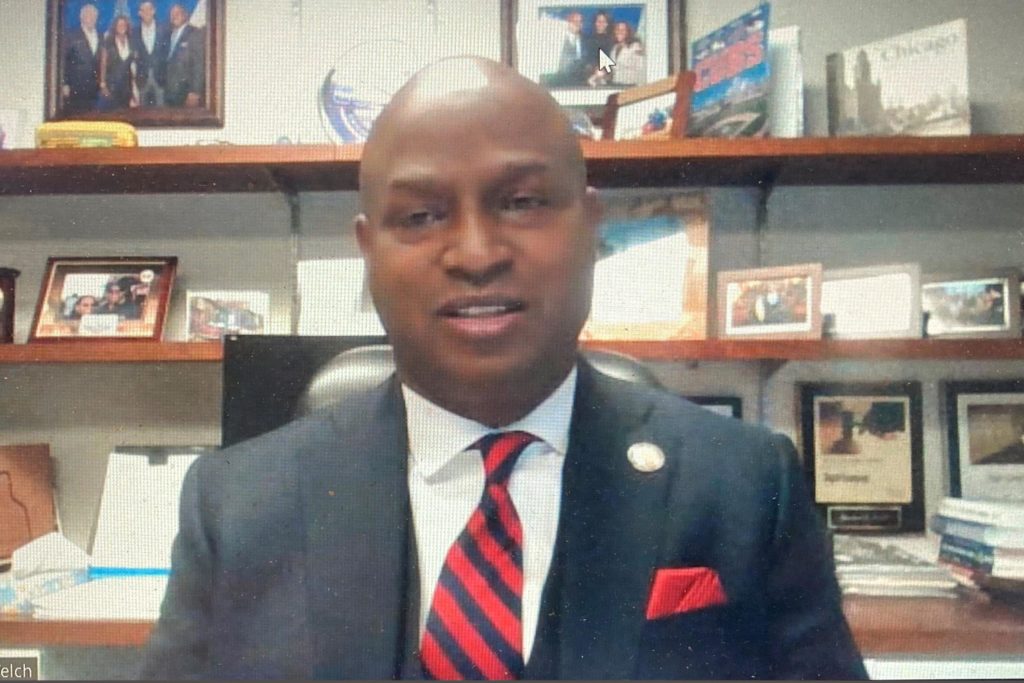
SPRINGFIELD, Ill. (AP) — The speaker of the Illinois House said the state’s child-welfare caseworkers need to be treated like frontline emergency responders after a Department of Children and Family Services investigator was killed last week during a home visit, the second such tragedy in four-and-a-half years.
Speaker Emanuel “Chris” Welch, a Hillside Democrat, was asked about the troubled agency during an interview Monday with The Associated Press, one of several sit-downs he had with Statehouse reporters to mark his first year in office.
Deidre Silas, an investigator who had just joined DCFS last summer, was stabbed to death Jan. 4 when she went to check on children in a home in Thayer, located south of Springfield.
Days later, a judge held the agency’s director in contempt of court for continued failure to find permanent placements for two children in his care. The extraordinary move highlights the growing needs for service and fewer foster homes, prompting another House leader to suggest “blowing up” the current system and starting anew.
“It’s extremely important that we ensure that DCFS caseworkers are treated like first responders. … We know that caseworkers do very important work for our children and we need to protect them,” said Welch, whose career in state government began with a brief 1997 stint at DCFS. “We’re going to have all the conversations that we need to have, but it’s going to take the House, the Senate, governor’s office, DCFS, all of us working together to address what’s happening at DCFS.”
It was a similar tragedy — the death of Pamela Knight, 59, after a brutal beating in 2017 during an attempt to remove an endangered child from his father — that prompted discussions of enhanced prison terms for harming caseworkers, but a Republican-led bill in 2018 failed. Senate Democrats floated the idea again last week with legislation following Silas’ death.
DCFS Director Marc Smith’s contempt charge came from a Cook County judge who was frustrated over Smith’s inability to remove two children in DCFS care from institutions months after they were ready for permanent placement. They’re among dozens of children who are ready for permanent placement after mental health or other types of treatment but for whom there are no homes available.
Spokesman Bill McCaffrey said in a statement that the agency is working aggressively on “the decades-long challenge of a lack of community resources and facilities for children with complex behavioral health needs,” which has only worsened with increased need — there are now 23,000 children in DCFS care.
Rep. Kathleen Willis, chairwoman of the House Adoption and Child Welfare Committee, was more blunt.
“We’re gonna have to probably blow up this thing to get it right,” the Northlake Democrat said. “I hate to say that, but what we’re doing is not working, throwing money at it isn’t solving the problem.”
One issue she’s pursuing is an overall accounting and cost-analysis study, similar to a private consultant’s top-to-bottom review several years ago of services for the intellectual and developmentally disabled and what the state should be paying for those services.
“When they (DCFS wards) are in transition before they get permanently placed, they’re not in anybody’s books,” Willis told The Associated Press. “I put in a request for a deeper dive into … where these children are, how long they’re in various locations and what services they’re being offered.”
Under another plan, Willis would create a Child Welfare Commission to oversee DCFS and discuss its needs and problems quarterly. “I don’t want to have the General Assembly only responding when a tragedy happens, or when we see an annual report or when they come before us asking for more money.”
When asked whether he retained confidence in Smith, the DCFS director, Welch reiterated his all-hands philosophy.
“DCFS is a tough agency and I got to tell you, he’s not all to blame,” Welch said. “It’s gonna take us all working together. We’ve got to ask him some tough questions and he’s got to give us some answers, don’t get me wrong. But all of the problems in DCFS don’t fall on one person.”
By JOHN O’CONNOR for the Associated Press
